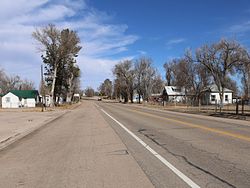Cope, Colorado
Appearance
(Redirected from Cope, CO)
Cope, Colorado | |
|---|---|
 U.S. Route 36 in Cope (2017) | |
Location within Washington County and Colorado | |
| Coordinates: 39°40′09″N 102°51′00″W / 39.6692216°N 102.8501063°W[1] | |
| Country | |
| State | |
| County | Washington County |
| Government | |
| • Type | unincorporated town |
| Area | |
• Total | 1.827 sq mi (4.731 km2) |
| • Land | 1.796 sq mi (4.651 km2) |
| • Water | 0.031 sq mi (0.080 km2) |
| Elevation | 4,429 ft (1,350 m) |
| Population | |
• Total | 53 |
| • Density | 29/sq mi (11/km2) |
| Time zone | UTC-7 (MST) |
| • Summer (DST) | UTC-6 (MDT) |
| ZIP Code[4] | 80812 |
| Area code | 970 |
| GNIS feature[2] | Cope CDP |
Cope is an unincorporated town, a post office, and a census-designated place (CDP) located in and governed by Washington County, Colorado, United States. The population was 53 at the 2020 census.[3] The Cope post office has the ZIP Code 80812.[4]
History
[edit]The Cope post office has been in operation since 1889.[5] The community was named after Johnathon C. Cope, a railroad official.[6]
Geography
[edit]The Cope CDP has an area of 1,169 acres (4.731 km2), including 20 acres (0.080 km2) of water.[1]
Demographics
[edit]The United States Census Bureau defined the Cope CDP for the United States Census 2020.
| Year | Pop. | ±% |
|---|---|---|
| 2020 | 53 | — |
| Source: United States Census Bureau | ||
See also
[edit]References
[edit]- ^ a b c "State of Colorado Census Designated Places - BAS20 - Data as of January 1, 2020". United States Census Bureau. Retrieved December 27, 2020.
- ^ a b c "U.S. Board on Geographic Names: Domestic Names". United States Geological Survey. Retrieved December 27, 2020.
- ^ a b United States Census Bureau. "Cope CDP, Colorado". Retrieved April 5, 2023.
- ^ a b "Look Up a ZIP Code". United States Postal Service. Retrieved December 27, 2020.
- ^ "Post offices". Jim Forte Postal History. Archived from the original on March 6, 2016. Retrieved June 25, 2016.
- ^ Dawson, John Frank. Place names in Colorado: why 700 communities were so named, 150 of Spanish or Indian origin. Denver, CO: The J. Frank Dawson Publishing Co. p. 15.



